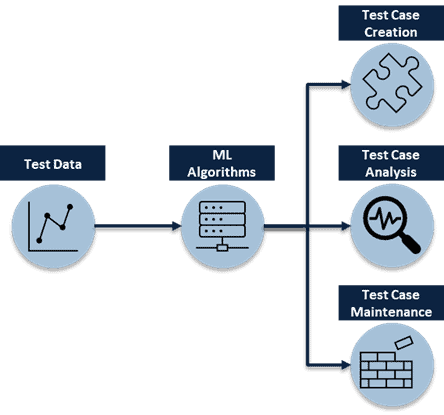“Artificial Intelligence is more profound than fire, electricity, or the internet” -Sundar Pichai, Chief Executive Officer of Alphabet
Background on AI/ML and Software Testing Trends
Artificial Intelligence (AI) and Machine Learning (ML) have gained significant attention due to their disruptive potential across industries. In the context of software testing, AI/ML can enhance testing methodologies and processes to achieve more effective and efficient results. AI continues to enter domains previously reserved for human skills and the results have been staggering. Machine Learning (ML), a subset of AI, further enables systems to learn and improve continuously through the application of algorithms.
What is AI/ML-based testing?
AI/ML-based testing methodologies have the potential to revolutionize test case creation, maintenance, and analysis, leading to expanded test coverage, improved accuracy, cost savings, and faster times to market. Such algorithms can access test data, make sense of it through pattern identification, and then utilize these predictions to successfully streamline software testing – thus simplifying test creation, reducing test maintenance, and driving new ways to assess the results. As we delve into the future of AI/ML in software testing, it becomes clear that testing teams need to prepare themselves for the upcoming advancements in this field.

Test Case Creation:
Using the analogy of self-driving cars, AI/ML tools are more similar to driving assistance than an actual driverless car1. In other words, AI technologies allow the user to write test cases manually while a machine automates them. AI/ML technologies augment test case creation by identifying reusable components and automating test authoring. ML models can further improve the test suite by identifying areas for enhancement and generating additional test cases.
Test Case Analysis:
AI/ML-based validation tools can automatically analyze code, identify bugs, and detect even the most granular changes. This thorough analysis allows testers to focus on high-risk areas and improve code quality.
Test Case Maintenance:
AI/ML can help answer the question, “If I’ve made a change in this piece of code, what’s the minimum number of tests I should be able to run to figure out whether this change is good or bad? 2” AI/ML tools employ self-learning capabilities to detect updates, upgrades, and code changes that require modifications in test scripts. These tools automatically revise test scripts, reducing the need for manual intervention. Additionally, ML models can identify the minimum number of tests needed to verify changed code, thus minimizing redundant test execution.
Benefits of AI/ML in Testing
By leveraging AI/ML in the testing process, organizations can unlock several benefits3. This section discusses the advantages of AI/ML-based testing:
More Expansive Test Coverage: Applying automation and AI/ML to testing can increase the overall depth and scope of tests. As expected, automation allows for a significantly higher degree of test execution.
AI/ML tools can learn from user sessions, identify missing tests, and self-correct, resulting in improved test coverage.
Improved Accuracy / Defect Reduction: Automation reduces errors in software testing, while AI/ML algorithms continuously update themselves to enhance accuracy. AI/ML-based testing aids in defect identification and offers opportunities for precise defect prediction.
Cost Savings and Faster Time to Market: Manual software testing is time-consuming and expensive. AI/ML-driven testing accelerates the process, reduces redundancy, and improves productivity. Faster test execution and the ability to rerun tests at a rapid pace leads to cost savings and a faster time to market.
Looking Ahead
The future of AI/ML in software testing holds great promise. Ongoing research in ML automation coupled with increased adoption of AI/ML testing applications is expected to drive significant improvements. Testing teams must prepare for these advancements by staying updated with evolving trends and acquiring the necessary skills and tools.
Conclusion
AI/ML-based testing is poised to reshape the software testing landscape, offering enhanced test case creation, maintenance, and analysis capabilities. The benefits include expansive test coverage, improved accuracy, cost savings, and faster times to market. As AI/ML continues to evolve, testing teams must embrace these trends and equip themselves with the knowledge and tools necessary for its overall adoption and successful implementation.
About BIP.Monticello
BIP.Monticello, a member of the BIP Group, is a management consulting firm supporting the financial services industry with its expertise in digital transformation, change management, and financial services advisory. Our understanding of the competitive forces reshaping business models in capital markets and digital banking are proven enablers that help our clients drive innovative change programs to be more competitive and gain market share in new and existing businesses.
Sources
1. AI In Test Automation: Here’s How It Works
2. 5-Great Ways to Use AI in Your Test Automation
3. AI in Software Testing – Benefits, Approaches, Tools to Look in 2022 (testingxperts.com)











